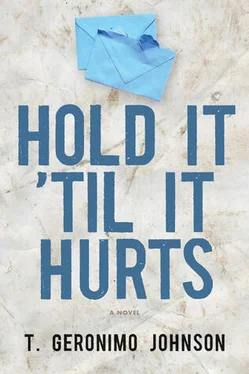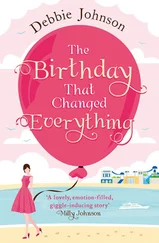They fell silent, gay jokes falling flat when there were only two of them.
“Going to any groups?” Wexler asked this like he was talking about a playoff game.
“You?” asked Achilles.
“I go to PTSD sometimes, but ain’t no crazier than when I went in. Speaking of crazy, Merri’s going to run a marathon and the VA got him a thing he can run on and he’s not talking about exploding melons anymore. I guess you’ve seen little Wages.”
Achilles was glad to hear that Merriweather was moving on with his life, that he had stopped picturing everyone who crossed him as dead, their heads burst open like melons, an image borrowed from Day of the Jackal, a French film in which the assassin used large fruit for target practice: “Blow the seeds out,” Merri would say. He deserved to be happy. In a world so hungry, a world that took so much, a man deserved something good in exchange for a foot. As for Wages, Achilles hadn’t seen him since that time at the casino a few months back. Little Kyle he’d seen only once, shortly after they brought him home. Whenever Wages called, Achilles claimed busy. Achilles suspected that Wages still thought the Bethany incident was the reason for their parting. Achilles wanted to tell him otherwise, but to bring it up would only reinforce Wages’s suspicions. That, or they’d have to start hanging out again, and Achilles just didn’t see how to make that happen. If Wages was in the room, Troy was in the room, then they all were, and then Achilles would have to introduce them all to Ines.
Wexler flashed a photo of Wages’s son, insisting it was the cutest baby he’d ever seen. Achilles agreed. He didn’t know exactly what babies were supposed to look like, only that they shouldn’t resemble the crushed infants he often saw when accompanying Ines to clinics: glazed in sweat, distended eyes, urgent, yurling cries, persistent twitching, even in sleep their tiny limbs flailing as if drowning.
On the drive to his jobsite, Wexler explained that several roads had been recently renamed after flowers to lure suburbanites into town. Achilles ran his fingers across the map, memorizing the terrain. He’d never seen the Fourth Ward, but he’d been with Ines enough to know exactly what it looked like. The corner store stocks tawny-tipped lettuce and lottery tickets. Near the front doors sit two barrels of ice, one filled with malt liquor named after animals and weapons, the other filled with syrupy drinks in little plastic jugs with foil tops, drinks with names like Red Jungle Punch, Yellow Jungle Punch, and Green Jungle Punch. When you buy a pack of cigarettes — they sell singles as well — they won’t give you matches. But they do sell several types of lighters, which is important, because at the counter they have a display case stocked with screens, pushers, and straight glass pipes: everything needed to pretend to satisfy your crush— pretend —because they will tell you the pipes are novelty items. They also trade in insults: Learn English! No, you learn English! As they toss your change on the counter, the mouth sometimes says, “Thank you.” The eyes often say, Dirty motherfucker. Half of the stores are run by Koreans, the other half by men who resemble, at first glance, those he was sent a quarter-way around the world to kill.
Outside the store, squat houses mired in moats of wrinkled concrete rimmed with crabgrass, stripped of copper and wire. Potholes are de facto speed bumps, large enough to swallow tricycle tires, but that doesn’t keep children out of the road. Streetlights are shot out. The neighborhood is bordered by a cemetery, a factory (possibly abandoned), a waste treatment plant, and railroad tracks or a highway. And indeed that was the Old Fourth Ward, except there was no waste treatment plant and there were two highways — the Connector and Freedom Parkway — so that the neighborhood was both bordered and bisected by high-traffic roads impassable by pedestrians. It looked like the Tremé District in New Orleans, or DC, or inner-city Baltimore.
They reached the jobsite in the dark morning hours, just before five a.m. Wexler worked for his cousin, Tony Sharon, renovating a historic Victorian home four blocks from the King Center. It was the tallest house on the block, with three floors and an attic bristling with narrow dormers sharp as steeples. Like all the houses on that stretch of Medgar Evers Avenue, from the second floor you could see the eternal flame hovering over Dr. King’s tomb, mere blocks from where he was born.
Wexler rambled as he led Achilles through the house and up the stairs, ducking under hanging plaster and high-stepping over debris. The interior of the house was being dismantled to save the antique fixtures such as wood trim, solid wood doors, and stained-glass windows. He followed Wexler up to the attic, brushing cobwebs aside, stepping cautiously from joist to joist like he was crossing a river on rocks.
From one dormer, Wexler pointed out the gingerbread houses and embroidered lawns of Inman Park. “Cross those tracks and you’re in Inman Park. They jog, we run. There, B&B means bed and breakfast. Here, it means boarded up or burned down.”
From another dormer, Wexler pointed out the vacant lot across the street. “That’s where the lunch bucket parks. Where I saw him.” In the dark there was little to be seen except a billboard-sized silhouette of MLK’s profile at the far end of the lot.
From the third dormer, Wexler pointed out a complex of scarred cinderblock buildings surrounded by a brick wall and painted the same shade of red as the clay upon which they stood, as if they had grown out of the earth. “That’s Banneker Homes, aka the Bricks. People are posted up at the entrance twenty-four seven, or one-six-eight as they say around here. When someone dies, they just dump the body outside the wall and call the police. Don’t go in there. For true, Chief. Someone gets shot or falls off a building every other week. That’s how they settle things. Don’t go in there. For true.”
Wexler pointed out the last dormer. “That’s the cemetery. It’s historic.” He tapped his temple. “I like to come up here and watch the traffic right before the sun comes up, when you can hear it better than you can see it. I think about going to another country, not like we did, but just to see how other people normally live. Shopping, talking, reading, whatever, in another language. It’s weird the first time you see people doing the shit you do, but in a different language. Someone said there’s an MLK boulevard in every city with blacks. There’s blacks in France and London. They have one? Probably not. There wasn’t one in Valdosta when I was a kid. I know it’s not true, but I’m curious. They say it’s always the worst street in the city. That can’t be true either. Look around.”
Wexler’s voice dropped like he was in the confessional. “It doesn’t look like much now, but wait a year. New street names. Flowers grow from shit. See, the neighborhood is changing. You have to watch it like white people.” He tapped his temple again. “They watch, they wait, and pounce when the time is right. That’s why my cousin Tony is successful. Other blacks are moving out. For them, success means moving away. But Cousin Tony bought these houses, just like the white folk. He’s going to be rich because he’s thinking like a white person.” He swung around to face Achilles. “How do you plan to do this?”
The Old Fourth Ward was nearly fifteen blocks across and twelve blocks up, much larger than the Tremé District, too much ground to cover on foot, yet it made little sense to drive from house to house. By the time he started the car and drove a block and parked, he could walk. So his plan was, “Watch, walk, and wait.”
“I mean, what if he doesn’t want to go?” said Wexler. “Are you going to check him in?”
Читать дальше












